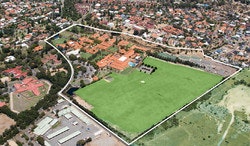|
TYPE OF ASSESSMENT
|
WEIGHTING
|
|
Oral communication
Interaction with others to exchange information, ideas, opinions and/or experiences in spoken Japanese. This can involve participating in an interview, a conversation and/or a discussion. Typically these tasks are administered under test conditions.
|
20%
|
|
Response: Listening
Comprehension and interpretation of, and response in English to, a range of Japanese spoken texts, such as interviews, announcements, conversations and/or discussions. Typically these tasks are administered under test conditions.
|
15%
|
|
Response: Viewing and reading
Comprehension and interpretation of, and response in English to, a range of Japanese print and audiovisual texts, such as emails, blog postings, films/television programs (excerpts), letters, reviews, articles, notes and/or messages. Typically these tasks are administered under test conditions.
|
20%
|
|
Written communication
Production of written texts to express information, ideas, opinions and/or experiences in Japanese. This can involve responding to a stimulus, such as an email, a blog posting, a letter, an image and/or an invitation, or writing a text, such as a journal/diary entry, an account, a letter, a review, a summary, and/or an email. Typically these tasks are administered under test conditions.
|
15%
|
|
Practical (oral) examination
Typically conducted at the end of each semester and/or unit. In preparation for Unit 3 and Unit 4, the examination should reflect the examination design brief included in the ATAR Year 12 syllabus for this course.
|
5%
|
|
Written examination
Typically conducted at the end of each semester and/or unit. In preparation for Unit 3 and Unit 4, the examination should reflect the examination design brief included in the ATAR Year 12 syllabus for this course.
|
25%
|
